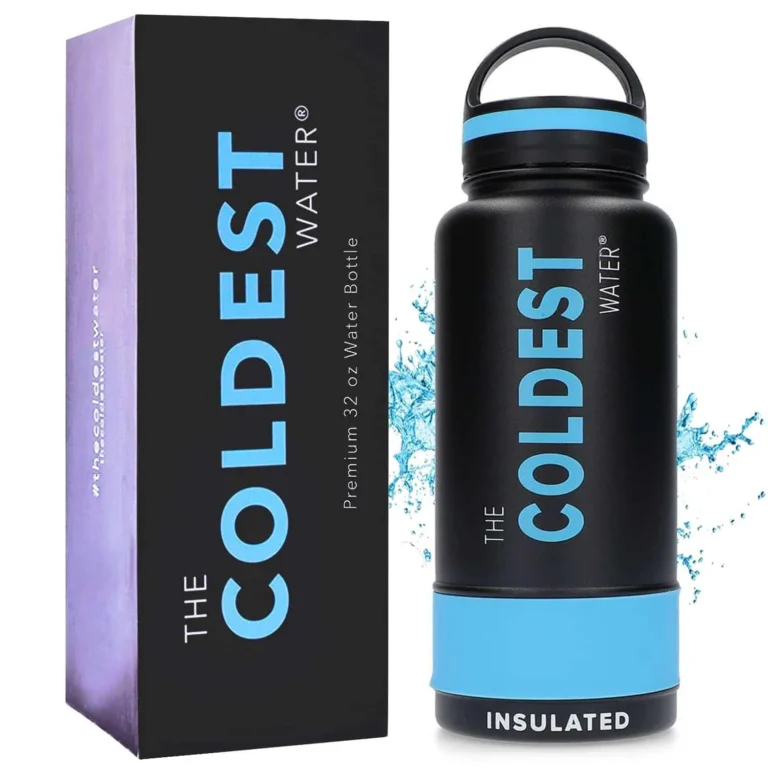Looking for a new reusable water bottle but can’t decide between aluminum or stainless steel? With so many options on the market, it can be hard to know what to choose. Both aluminum and stainless steel bottles have pros and cons, and it’s important to consider them before making a purchase. In this blog post, we’ll explore the differences between aluminum and stainless steel water bottles and help you decide which one is right for you. Whether you’re concerned about durability, sustainability, or taste, we’ve got you covered. So grab a glass of water and let’s dive in!
I. Explanation of the importance of bringing reusable water bottles
Reusable water bottles have become increasingly popular in recent years, and for good reason. The importance of bringing reusable water bottles cannot be overstated. First and foremost, using reusable bottles helps reduce the staggering amount of waste generated by single-use plastic bottles. Every year, millions of plastic bottles end up in landfills or pollute our oceans.
Moreover, using reusable bottles is also a more cost-effective and sustainable option in the long run. By investing in a durable and high-quality water bottle, you can save money and help minimize your environmental footprint.
Additionally, reusable water bottles are more convenient and practical. They can be easily refilled, allowing you to stay hydrated wherever you go without relying on single-use bottles. They are also designed to keep your drinks hot or cold for longer periods, ensuring a refreshing sip whenever you need it.
In summary, bringing reusable water bottles is not only environmentally responsible, but also a smart and convenient choice for individuals looking to make a positive impact while quenching their thirst.
Comparison of popular materials for reusable water bottles
When it comes to reusable water bottles, there are a few popular materials to choose from: aluminum and stainless steel. Aluminum bottles are lightweight and easy to carry, making them ideal for on-the-go hydration. They are also more affordable than stainless steel bottles. However, aluminum is less durable and more prone to dents and scratches. Additionally, if not properly cared for, aluminum bottles may corrode over time. On the other hand, stainless steel bottles are durable and long-lasting. They are resistant to dents and scratches and do not corrode or rust. Stainless steel bottles also have good thermal conductivity, keeping your drinks hot or cold for longer periods. The downside is that they are heavier and bulkier than aluminum bottles and can be more expensive. Some stainless steel bottles may require frequent cleaning to prevent odors. When considering the environmental impact, both aluminum and stainless steel are highly recyclable materials. Ultimately, the best option depends on individual preferences and needs.
II. Benefits of Aluminum Water Bottles
Lightweight and easy to carry
When it comes to choosing a reusable water bottle, one of the key factors to consider is its weight and portability. In this aspect, aluminum water bottles have a clear advantage over stainless steel bottles. Aluminum is a lightweight metal, making the bottles much easier to carry around, whether you’re going for a hike or simply commuting to work. With their lightweight nature, aluminum bottles won’t weigh you down or take up much space in your bag. This makes them a great choice for people who are always on the go and value convenience. So, if you prioritize a lightweight and easy-to-carry water bottle, aluminum is the way to go.
Affordable
One of the advantages of aluminum water bottles over stainless steel is their affordability. Aluminum as a material is generally less expensive compared to stainless steel, making aluminum bottles a more budget-friendly option. This is especially beneficial for individuals who are looking for a cost-effective reusable water bottle without compromising on quality. With aluminum bottles, you can enjoy the benefits of a durable and long-lasting container without breaking the bank. The affordability of aluminum water bottles makes them a popular choice for those who are conscious of their budget but still want to make the switch to reusable and sustainable options.
Less prone to dents and scratches
Stainless steel water bottles are known for their durability and resistance to dents and scratches. Unlike aluminum bottles, which tend to dent and scratch easily, stainless steel bottles can withstand regular wear and tear without losing their shape or appearance. This is a major advantage for individuals who lead an active lifestyle or frequently carry their water bottles in bags or backpacks. With a stainless steel bottle, you can have peace of mind knowing that it will remain in good condition even after months or years of use. So if you’re looking for a water bottle that can truly stand the test of time, stainless steel is a great choice.
Does not rust
One of the key advantages of stainless steel water bottles is that they do not rust. Unlike other metals, stainless steel has a high resistance to corrosion and oxidation, which means that it can withstand exposure to moisture without developing rust. This makes stainless steel bottles a reliable choice for long-term use, as they will retain their integrity and appearance even after extended exposure to water or humid conditions. Additionally, the lack of rusting in stainless steel bottles ensures that there is no risk of rust particles contaminating your drink, keeping it safe and hygienic. Whether you’re using your stainless steel bottle for hot or cold beverages, you can trust that it will remain rust-free and provide you with a clean and enjoyable drinking experience.
Good thermal conductivity
One key factor to consider when choosing between aluminum and stainless steel water bottles is their thermal conductivity. Both materials have good thermal conductivity, meaning they can effectively maintain the temperature of the liquid inside the bottle for longer periods of time. However, stainless steel bottles tend to be more effective at keeping drinks hot or cold due to their higher density and thicker walls. This makes stainless steel bottles a great choice for those who want their drinks to stay at a desired temperature for an extended period, especially during hot summer or cold winter days. On the other hand, aluminum bottles provide a cooler touch and can cool drinks faster than stainless steel bottles. So, when choosing between the two, think about your preference for temperature retention and the specific needs of your daily activities.
III. Drawbacks of Aluminum Water Bottles
Not as durable as stainless steel
When it comes to durability, aluminum water bottles are not as strong as stainless steel ones. While both materials are known for their impressive durability, stainless steel outshines aluminum in this aspect. Aluminum bottles are prone to denting with excessive force, and they may also corrode if not properly cared for. On the other hand, stainless steel bottles are resistant to dents and scratches, and they do not corrode or rust. This makes stainless steel a more reliable choice for those who need a water bottle that can withstand the wear and tear of daily use. So, if you prioritize durability and longevity, stainless steel is the way to go.
Prone to denting with excessive force
When it comes to durability, stainless steel water bottles have the upper hand compared to aluminum bottles. Aluminum bottles are prone to denting with excessive force, which can affect their overall shape and functionality. While aluminum is a lightweight material, it may not be able to withstand rough handling or accidental drops as well as stainless steel. On the other hand, stainless steel bottles are known for their sturdiness and resistance to dents. They are less likely to get damaged, even with rough use. So, if you prioritize a water bottle that can handle the occasional bump or drop, stainless steel would be the more suitable choice.
May corrode if not properly cared for
Aluminum water bottles may corrode if not properly cared for. While aluminum is a durable material, it is susceptible to corrosion when exposed to certain substances and conditions. This is why most aluminum bottles are lined with an enamel resin or epoxy layer to act as a barrier between the metal and the contents of the bottle. However, it is important to note that even with the lining, the bottle may still corrode if not handled and cared for properly. It is recommended to follow the manufacturer’s instructions for cleaning and maintenance to prevent corrosion. Regular cleaning, avoiding harsh chemicals, and proper storage can help prolong the lifespan of an aluminum water bottle and prevent any corrosion issues.
IV. Benefits of Stainless Steel Water Bottles
Durable and long-lasting
Stainless steel water bottles are known for their durability and long-lasting nature. These bottles are designed to withstand the wear and tear of daily usage, making them a reliable choice for those looking for a water container that will last a long time. Unlike aluminum bottles, stainless steel bottles are resistant to dents and scratches, ensuring that they remain in good condition even after multiple uses. Additionally, stainless steel does not corrode or rust, further enhancing its durability. This makes stainless steel bottles a great option for individuals who prioritize durability and longevity in their reusable water bottles. While they may be heavier and bulkier than aluminum bottles, their durability and long lifespan make them a worthwhile investment.
Resistant to dents and scratches
Another advantage of stainless steel water bottles is that they are resistant to dents and scratches. Unlike aluminum bottles, which tend to dent and scratch more easily, stainless steel bottles can withstand daily wear and tear without losing their shape or appearance. This makes them a durable and long-lasting option for those who are looking for a water bottle that can withstand rough handling or outdoor activities. So if you’re someone who is always on the go or enjoys outdoor adventures, a stainless steel water bottle may be the better choice for you. Its sturdy construction ensures that it will hold up well, even with excessive force or accidental drops.
Does not corrode or rust
Stainless steel water bottles are known for their durability and resistance to corrosion and rust. Unlike aluminum, stainless steel does not react with certain liquids, making it a safer choice for storing your beverages. This non-reactivity also ensures that your drinks will taste fresh and unaffected by any metallic flavors. Stainless steel bottles are made from alloys that contain chromium, which helps prevent rusting and corrosion. This means that even with frequent use, your stainless steel bottle will remain in excellent condition. With its long-lasting quality, you can rely on a stainless steel water bottle to withstand the test of time and provide you with a reliable and safe drinking container.
Keeps drinks hot or cold for longer periods due to its insulating properties
The insulating properties of stainless steel water bottles are a significant advantage when it comes to keeping drinks hot or cold for longer periods. Stainless steel has a low thermal conductivity, which means it takes longer for heat to transfer from the surrounding environment to the beverage inside the bottle. This is particularly beneficial when you want to enjoy a hot cup of coffee or a refreshing cold drink throughout the day. Stainless steel bottles, especially those with double-wall insulation, can keep hot beverages hot for up to 12 hours and icy cold beverages cold for up to 24 hours. So, whether you’re heading to the office or embarking on an outdoor adventure, a stainless steel water bottle ensures that your drinks stay at the desired temperature for extended periods.
V. Drawbacks of Stainless Steel Water Bottles
Heavier and bulkier than aluminum bottles
Stainless steel water bottles have their own set of advantages and disadvantages when compared to aluminum bottles. One drawback is that stainless steel bottles are generally heavier and bulkier than their aluminum counterparts. This can be a consideration for individuals who prioritize portability and ease of carrying. However, the added weight and size of stainless steel bottles can be attributed to their sturdier material and insulating properties, which keep your drinks colder for longer periods of time. So, if you’re looking for a bottle that can withstand heavy-hitting activities or extended outdoor adventures, stainless steel would be the better choice. Ultimately, the decision between aluminum and stainless steel bottles will depend on individual preferences and needs.
More expensive
When considering the cost factor, it’s worth noting that stainless steel water bottles are generally more expensive compared to their aluminum counterparts. This price difference is mainly due to the higher production costs associated with stainless steel, as well as the added durability and long-lasting properties it offers. However, it’s important to remember that investing in a quality water bottle can save you money in the long run by eliminating the need for disposable plastic bottles. While aluminum bottles may be a more affordable option upfront, they may not provide the same level of durability and longevity as stainless steel. Ultimately, the decision between cost and quality will depend on your individual preferences and needs.
May require frequent cleaning to prevent odors
Aluminum water bottles may require more frequent cleaning to prevent odors. Over time, residue from beverages can accumulate and contribute to an unpleasant smell in your bottle. However, there are simple steps you can take to keep your aluminum bottle odor-free. Regular washing with warm soapy water is essential. Additionally, using a bottle brush and cleaning tablets can help remove any residue or buildup. If you notice a persistent odor, you can try a vinegar rinse or add baking soda to eliminate lingering smells. By properly caring for your aluminum water bottle and implementing regular cleaning practices, you can ensure that it stays fresh and odor-free, allowing you to enjoy your favorite beverages without any unwanted scents.
VI. Environmental Impact
Comparison of the environmental impact of both materials
When it comes to considering the environmental impact of reusable water bottles, both aluminum and stainless steel have their pros and cons. Aluminum is a highly recyclable material, making it a sustainable choice. However, the production process for aluminum bottles requires a significant amount of energy, contributing to carbon emissions. On the other hand, stainless steel bottles are also recyclable and have a longer lifespan, reducing waste. They are less energy-intensive during production compared to aluminum bottles. Both materials help reduce the use of single-use plastic bottles, which contribute to the growing plastic pollution problem. Ultimately, the best choice depends on individual preferences and needs, as well as the availability of recycling facilities in your area.
Explanation of how stainless steel can be recycled
Stainless steel is a highly recyclable material, making it a great choice for those who value sustainability. The recycling process for stainless steel involves melting down the metal and reshaping it into new products. This can be done repeatedly without compromising the quality of the material. In fact, stainless steel is one of the most recycled materials on Earth. Recycling stainless steel not only helps reduce the demand for raw materials but also saves energy and reduces greenhouse gas emissions. By choosing a stainless steel water bottle, you are contributing to the circular economy and helping to minimize waste. So, not only will you enjoy the durability and long-lasting nature of stainless steel, but you’ll also be making an eco-friendly choice.
Recommendation for the best option based on individual preferences and needs.
Based on individual preferences and needs, the best option between an aluminum water bottle and a stainless steel water bottle can vary. If durability and long-lasting performance are a priority, stainless steel is the better choice. Stainless steel bottles are resistant to dents and scratches, do not rust, and have good thermal conductivity. They are also more suitable for outdoor activities. On the other hand, if lightweight and easy portability are important factors, aluminum bottles are recommended. They are lighter and cool drinks faster. Additionally, aluminum bottles are often considered more stylish and affordable. Ultimately, the decision should be based on personal preferences and lifestyle requirements. Whether you value durability or convenience, both aluminum and stainless steel bottles are sustainable choices for reducing single-use plastic waste.




